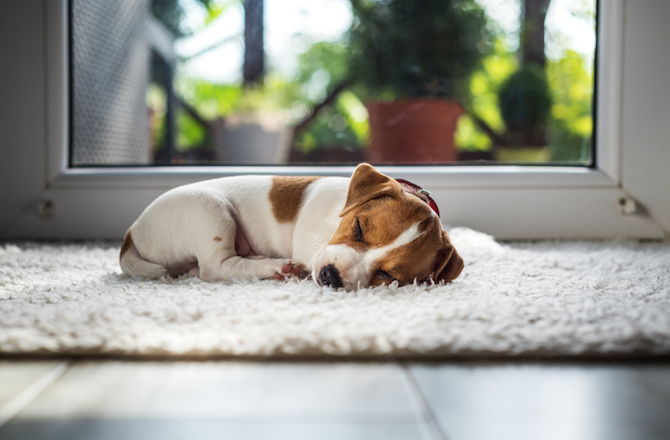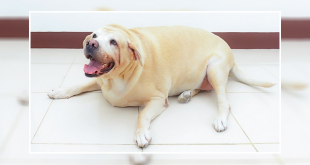Sleep disorders aren’t just a problem for humans, they can be a major issue for your dogs as well. Sleep is necessary for your dog’s overall health.
It makes them feel more energetic and rested. If your dog is suffering from sleeping issues, he can become more sluggish during the day or seem more disoriented while performing normal tasks.
In addition, a lack of sleep can make your dog more aggressive, weaken the immune system, increase the risk of infection, or can develop other behavioral problems.
Is your dog getting enough sleep?
Certain sleep disorders are related to genetics and family history. Some dog breeds that are more prone to sleep disorders are English Bulldogs, Dachshunds, Poodles, Doberman Pinschers, Beagles, and Labrador Retrievers.
The cause of sleeplessness in dogs may be due to:
- Lack or inadequacy of exercise (your dog is not tired enough to have a good sleep)
- Emotional disorders, such as anxiety, depression, and stress.
- Health issues, such as pain due to hip dysplasia, arthritis, or any injury, kidney problems, parasite infestations, urinary incontinence, diabetes, and allergies.
- Prescribed medications, such as corticosteroids (e.g., prednisone), often used to treat a variety of autoimmune or allergic disorders;
- Old age
4 Common sleeping disorders in dogs
Here is a list of common sleeping disorders that your furry friends can experience at any stage of their life:
#1. Insomnia
Insomnia is rare in dogs and usually indicates another health problem. Your dog may experience insomnia due to many health issues such as arthritis, kidney disease, fleas, diabetes, conjunctive dysfunction, or some kind of injury.
Moreover, stress and anxiety can disrupt normal sleeping patterns and can cause insomnia in your dogs. You can learn more about treating stress and anxiety conditions in your dog at Ubreakifix.com. They share some good tips on how to treat anxiety in dogs.
How to treat?
- Take your dog to a veterinarian to determine the real cause of insomnia. Your vet may recommend some prescription painkillers to treat arthritis-related pain, resulting in better and comfortable sleep.
- Acupuncture can help your dog get better sleep by relieving anxiety and pain.
- For older dogs with cognitive dysfunction, a diet rich in omega-3 fatty acids can improve the sleep-wake cycle.
- Some other strategies to treat insomnia includes:
-
- Increase their physical activity during the day,
- Schedule playtime before bedtime,
- Buy an orthopedic bed if your dog is suffering from arthritis,
- Use aromatherapy with lavender and chamomile in the sleeping area.
- CBD oils to treat insomnia due to anxiety and stress.
#2. Sleep Apnea
Sleep Apnea is quite rare in dogs. It is commonly seen in obese dogs and flat-faced breeds such as Boston Terriers, English Bulldogs, and Pugs. Sleep Apnea disorder collapses or narrows the airway, due to which your dog’s breathing is interrupted during sleep.
These constant sleep interruptions can leave your dog sluggish and tired during the day. The major symptom of sleep apnea in dogs is loud and chronic snoring.
How to treat?
- Vets usually prescribe a weight-loss diet for overweight dogs with sleep apnea.
- Surgery to fix the malformed nostrils or respiratory systems.
- You can give steam or use humidifiers to help open up your dog’s airways.
Untreated sleep apnea can be life-threatening. If your dog snores too loud, seek veterinary treatment as soon as possible.
#3. Narcolepsy
Narcolepsy is a noteworthy sleeping disorder in dogs. A dog with narcolepsy disorder can suddenly collapse and fall asleep, usually after a period of excitement or physical activity (such as playing, eating, and greeting family members, etc.) Basically, Narcolepsy is a nervous system sleep disorder in which the hypocretin levels of your dog get reduced, leading to sleeping issues. The hypocretin chemical helps in maintaining alertness and normal sleeping patterns.
Narcolepsy genetic disorder is commonly seen in dogs such as Doberman Pinschers, Poodles, and Labrador Retrievers. Other narcolepsy causes include obesity, inactivity, and immune system dysfunction. Sometimes, the cause is unknown.
The major symptoms of Narcolepsy are sleep attacks or cataplexy (muscle paralysis). These attacks last for a few seconds to a couple of minutes and can be because of strong emotions during feeding time or while playing.
How to treat?
- Narcolepsy is not curable but can be managed by identifying its triggers and minimizing them.
- You can gently pet and use comforting words to lessen the severity and duration of your dog’s narcoleptic episodes.
- Your vet may prescribe some medications to stimulate wakefulness, reduce hyperactivity, or manage the narcolepsy’s frequency.
#4. REM Disorder
Have you ever seen your dog pawing at the air while sleeping? The occasional muffled sleep howling, barking, slight twitching, and paddling are some of the symptoms of REM Behavior Disorder in dogs. REM Behavior Disorder can be a serious condition.
Dogs with the REM disorder may run into walls, attack objects, or bite someone while sleeping. In severe cases, your dog may sleepwalk or act out a dream, which can make your dog feel tired when he awakes.
How to treat?
Consult with your vet. A vet may prescribe a medication called clonazepam to reduce physical activity during sleep.
If you think your dog may have a sleep disorder, consult with your doctor ASAP.
Share your thoughts with us in the comments below!
 DogExpress
DogExpress


















 in Chandigarh, India.
in Chandigarh, India. 

